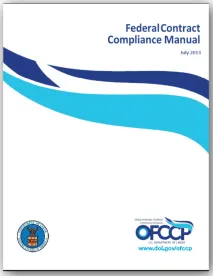On October 7, 2020, the U.S. Department of Labor's Office of Federal Contract Compliance Programs (OFCCP) issued Frequently Asked Questions clarifying President Trump's recent Executive Order on Combating Race and Sex Stereotyping. The Executive Order, issued on September 22, 2020, prohibits federal contractors from using any workplace training "that inculcates in its employees any form of race or sex stereotyping or any form of race or sex scapegoating." The Executive Order became effective on September 22; however, the OFCCP has now clarified that these requirements for federal contractors and subcontractors only apply to contracts entered into 60 days after the date of the September 22 Executive Order. Thus, these requirements only apply to contracts entered into or renewed after November 21, 2020.
The September 22 Executive Order generally covers contractors and subcontractors subject to Executive Order 11246, which includes individuals or businesses holding qualifying contracts or subcontracts exceeding $10,000 in a 12-month period with the United States government. In addition, federal grant recipients may also be impacted by the Executive Order if the head of the agency that issues their grant programs conditions the award on certain certifications related to this Executive Order. Lastly, the Executive Order also covers the United States Uniformed Services.
The OFCCP, which polices workplace bias among federal contractors, explained that implicit bias trainings are prohibited only to the extent they teach or imply that "an individual, by virtue of his or her race, sex, and/or national origin, is racist, sexist, oppressive, or biased, whether consciously or unconsciously." Trainings are not prohibited if they are designed to inform workers, or foster discussion, about pre-conceptions, opinions, or stereotypes that people—regardless of their race or sex—may have regarding people who are different.
The guidance also defines a number of the terms that Trump used in the September 22 Executive Order, such as "race or sex stereotyping" and "scapegoating," and also provides examples of "scapegoating." Thus, based on the Executive Order and the guidance, federal contractors and subcontractors cannot train their employees that "[a]n individual, by virtue of his or her race or sex, bears responsibility for actions committed in the past by other members of the same race or sex," or that "[m]eritocracy or traits such as a hard work ethic are racist or sexist, or were created by a particular race to oppress another race."
Notably, the OFCCP is also setting up a "hotline" and will investigate complaints that federal contractors are holding prohibited training sessions. Businesses with federal contracts could have their contracts canceled, terminated or suspended, in whole or in part, if they are found to be in violation of the September 22 Executive Order.
What Does this Mean for Businesses?
Federal Contractors
For the time being, federal contractors covered by the September 22 Executive Order should assume that they will need to comply with the Order's requirements. Therefore, federal contractors and subcontractors who anticipate entering into new or renewed covered federal contracts after November 21, 2020, may want to proactively evaluate their equity, diversity, and inclusion training programs and determine whether any changes may be required to avoid penalties under the Executive Order.
Private Employers with No Federal Contracts
For the time being, private employers without covered federal contracts do not need to alter their current training programs or comply with this September 22 Executive Order. However, all private employers should carefully watch for further regulatory developments and guidance because the Order remarkably instructs the U.S. Attorney General to assess the extent to which private employer training promulgates “divisive concepts” that could give rise to hostile work environment claims in violation of Title VII of the Civil Rights Act.
Long Term Impacts of the Order
It is too soon to tell what long term impact this September 22 Executive Order will have on employers. The future of the Order itself is uncertain given the upcoming presidential election. If President Trump loses re-election, it is almost certain that the Executive Order will be rescinded. Moreover, nonprofit and interest groups may bring legal challenges against the Executive Order and request that it be overturned.




 />i
/>i
